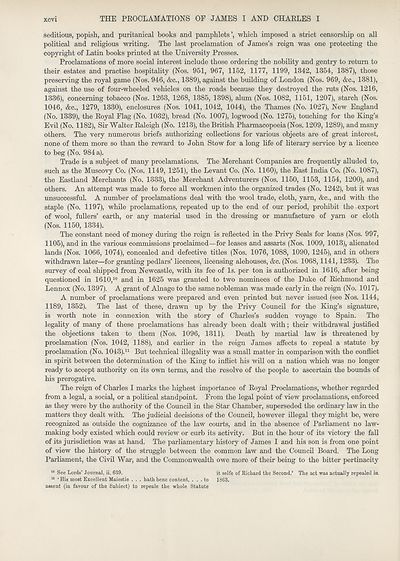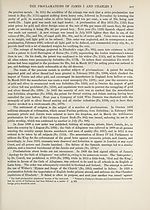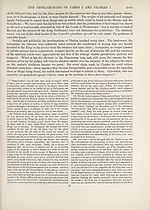Bibliography of royal proclamations of the Tudor and Stuart sovereigns and of others published under authority, 1485-1714 > England and Wales
(108) Page xcvi
Download files
Complete book:
Individual page:
Thumbnail gallery: Grid view | List view

XCV1
THE PROCLAMATIONS OF JAMES I AND CHARLES I
seditious, popish, and puritanical books and pamphlets which imposed a strict censorship on all
political and religious writing. The last proclamation of James’s reign was one protecting the
copyright of Latin books printed at the University Presses.
Proclamations of more social interest include those ordering the nobility and gentry to return to
their estates and practise hospitality (Nos. 951, 967, 1152, 1177, 1199, 1342, 1354, 1387), those
preserving the royal game (Nos. 946, &c., 1389), against the building of London (Nos. 969, &c., 1381),
against the use of four-wheeled vehicles on the roads because they destroyed the ruts (Nos. 1216,
1336), concerning tobacco (Nos. 1263, 1268, 1385, 1398), alum (Nos. 1082, 1151, 1207), starch (Nos.
1046, &c., 1279, 1330), enclosures (Nos. 1041, 1042, 1044), the Thames (No. 1027), New England
(No. 1339), the Royal Flag (No. 1032), bread (No. 1007), logwood (No. 1275), touching for the King’s
Evil (No. 1182), Sir Walter Raleigh (No. 1213), the British Pharmacopoeia (Nos. 1209, 1289), and many
others. The very numerous briefs authorizing collections for various objects are of great interest,
none of them more so than the reward to John Stow for a long life of literary service by a licence
to beg (No. 984 a).
Trade is a subject of many proclamations. The Merchant Companies are frequently alluded to,
such as the Muscovy Co. (Nos. 1149, 1251), the Levant Co. (No. 1160), the East India Co. (No. 1087),
the Eastland Merchants (No. 1333), the Merchant Adventurers (Nos. 1150, 1153, 1154, 1200), and
others. An attempt was made to force all workmen into the organized trades (No. 1242), but it was
unsuccessful. A number of proclamations deal with the wool trade, cloth, yarn, &c., and with the
staple (No. 1197), while proclamations, repeated up to the end of our period, prohibit the export
of wool, fullers’ earth, or any material used in the dressing or manufacture of yarn or cloth
(Nos. 1150, 1334).
The constant need of money during the reign is reflected in the Privy Seals for loans (Nos. 997,
1105), and in the various commissions proclaimed—for leases and assarts (Nos. 1009, 1013), alienated
lands (Nos. 1066, 1074), concealed and defective titles (Nos. 1076, 1088, 1090, 1245), and in others
withdrawn later—for granting pedlars’ licences, licensing alehouses, &c. (Nos. 1068,1141,1233). The
survey of coal shipped from Newcastle, with its fee of Is. per ton is authorized in 1616, after being
questioned in 1610,10 and in 1625 was granted to two nominees of the Duke of Richmond and
Lennox (No. 1397). A grant of Alnage to the same nobleman was made early in the reign (No. 1017).
A number of proclamations were prepared and even printed but never issued (see Nos. 1144,
1189, 1352). The last of these, drawn up by the Privy Council for the King’s signature,
is worth note in connexion with the story of Charles’s sudden voyage to Spain. The
legality of many of these proclamations has already been dealt with; their withdrawal justified
the objections taken to them (Nos. 1096, 1311). Death by martial law is threatened by
proclamation (Nos. 1042, 1188), and earlier in the reign James affects to repeal a statute by
proclamation (No. 1043).11 But technical illegality was a small matter in comparison with the conflict
in spirit between the determination of the King to inflict his will on a nation which was no longer
ready to accept authority on its own terms, and the resolve of the people to ascertain the bounds of
his prerogative.
The reign of Charles I marks the highest importance of Royal Proclamations, whether regarded
from a legal, a social, or a political standpoint. From the legal point of view proclamations, enforced
as they were by the authority of the Council in the Star Chamber, superseded the ordinary law in the
matters they dealt with. The judicial decisions of the Council, however illegal they might be, were
recognized as outside the cognizance of the law courts, and in the absence of Parliament no law¬
making body existed which could review or curb its activity. But in the hour of its victory the fall
of its jurisdiction was at hand. The parliamentary history of James I and his son is from one point
of view the history of the struggle between the common law and the Council Board. The Long
Parliament, the Civil War, and the Commonwealth owe more of their being to the bitter pertinacity
10 See Lords’ Journal, ii. 639. it selfe of Richard the Second.’ The act was actually repealed in
11 ‘ His most Excellent Maiestie . . . hath bene content, . . . to 1863.
assent (in favour of the Subiect) to repeale the whole Statute
THE PROCLAMATIONS OF JAMES I AND CHARLES I
seditious, popish, and puritanical books and pamphlets which imposed a strict censorship on all
political and religious writing. The last proclamation of James’s reign was one protecting the
copyright of Latin books printed at the University Presses.
Proclamations of more social interest include those ordering the nobility and gentry to return to
their estates and practise hospitality (Nos. 951, 967, 1152, 1177, 1199, 1342, 1354, 1387), those
preserving the royal game (Nos. 946, &c., 1389), against the building of London (Nos. 969, &c., 1381),
against the use of four-wheeled vehicles on the roads because they destroyed the ruts (Nos. 1216,
1336), concerning tobacco (Nos. 1263, 1268, 1385, 1398), alum (Nos. 1082, 1151, 1207), starch (Nos.
1046, &c., 1279, 1330), enclosures (Nos. 1041, 1042, 1044), the Thames (No. 1027), New England
(No. 1339), the Royal Flag (No. 1032), bread (No. 1007), logwood (No. 1275), touching for the King’s
Evil (No. 1182), Sir Walter Raleigh (No. 1213), the British Pharmacopoeia (Nos. 1209, 1289), and many
others. The very numerous briefs authorizing collections for various objects are of great interest,
none of them more so than the reward to John Stow for a long life of literary service by a licence
to beg (No. 984 a).
Trade is a subject of many proclamations. The Merchant Companies are frequently alluded to,
such as the Muscovy Co. (Nos. 1149, 1251), the Levant Co. (No. 1160), the East India Co. (No. 1087),
the Eastland Merchants (No. 1333), the Merchant Adventurers (Nos. 1150, 1153, 1154, 1200), and
others. An attempt was made to force all workmen into the organized trades (No. 1242), but it was
unsuccessful. A number of proclamations deal with the wool trade, cloth, yarn, &c., and with the
staple (No. 1197), while proclamations, repeated up to the end of our period, prohibit the export
of wool, fullers’ earth, or any material used in the dressing or manufacture of yarn or cloth
(Nos. 1150, 1334).
The constant need of money during the reign is reflected in the Privy Seals for loans (Nos. 997,
1105), and in the various commissions proclaimed—for leases and assarts (Nos. 1009, 1013), alienated
lands (Nos. 1066, 1074), concealed and defective titles (Nos. 1076, 1088, 1090, 1245), and in others
withdrawn later—for granting pedlars’ licences, licensing alehouses, &c. (Nos. 1068,1141,1233). The
survey of coal shipped from Newcastle, with its fee of Is. per ton is authorized in 1616, after being
questioned in 1610,10 and in 1625 was granted to two nominees of the Duke of Richmond and
Lennox (No. 1397). A grant of Alnage to the same nobleman was made early in the reign (No. 1017).
A number of proclamations were prepared and even printed but never issued (see Nos. 1144,
1189, 1352). The last of these, drawn up by the Privy Council for the King’s signature,
is worth note in connexion with the story of Charles’s sudden voyage to Spain. The
legality of many of these proclamations has already been dealt with; their withdrawal justified
the objections taken to them (Nos. 1096, 1311). Death by martial law is threatened by
proclamation (Nos. 1042, 1188), and earlier in the reign James affects to repeal a statute by
proclamation (No. 1043).11 But technical illegality was a small matter in comparison with the conflict
in spirit between the determination of the King to inflict his will on a nation which was no longer
ready to accept authority on its own terms, and the resolve of the people to ascertain the bounds of
his prerogative.
The reign of Charles I marks the highest importance of Royal Proclamations, whether regarded
from a legal, a social, or a political standpoint. From the legal point of view proclamations, enforced
as they were by the authority of the Council in the Star Chamber, superseded the ordinary law in the
matters they dealt with. The judicial decisions of the Council, however illegal they might be, were
recognized as outside the cognizance of the law courts, and in the absence of Parliament no law¬
making body existed which could review or curb its activity. But in the hour of its victory the fall
of its jurisdiction was at hand. The parliamentary history of James I and his son is from one point
of view the history of the struggle between the common law and the Council Board. The Long
Parliament, the Civil War, and the Commonwealth owe more of their being to the bitter pertinacity
10 See Lords’ Journal, ii. 639. it selfe of Richard the Second.’ The act was actually repealed in
11 ‘ His most Excellent Maiestie . . . hath bene content, . . . to 1863.
assent (in favour of the Subiect) to repeale the whole Statute
Set display mode to: Large image | Transcription
Images and transcriptions on this page, including medium image downloads, may be used under the Creative Commons Attribution 4.0 International Licence unless otherwise stated. ![]()
| Permanent URL | https://digital.nls.uk/106225234 |
|---|
| Attribution and copyright: |
|
|---|
| Description | Privately printed catalogues of the special collections of the Bibliotheca Lindesiana, the family library of the Earls of Crawford and Balcarres. Reformation Tracts, English Newspapers and De Bry Collection catalogues provide the only record of the contents of these collections. Also include catalogues of Bibliotheca Lindesiana collections now held elsewhere. |
|---|

